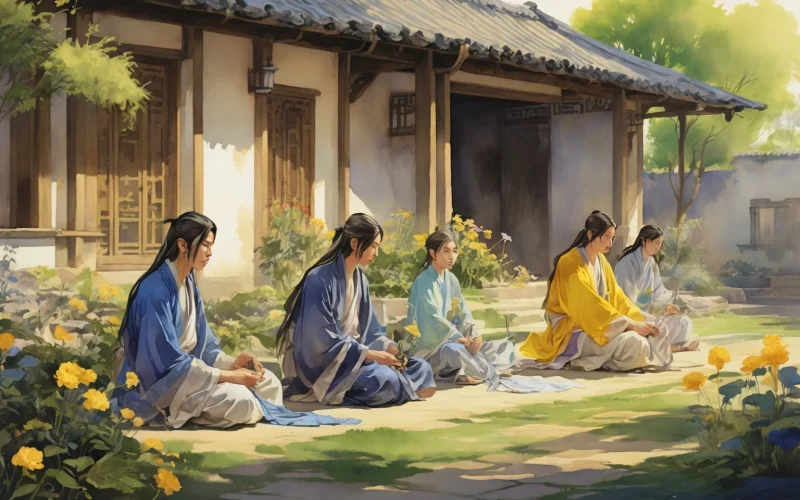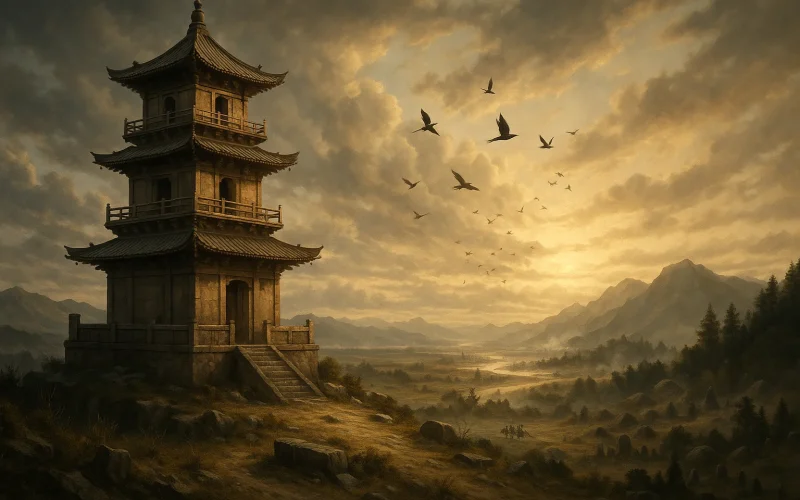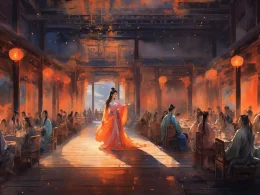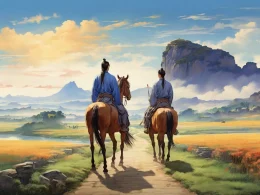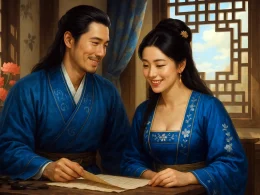A happy rain in good time falls;
The first thunder from the east rolls.
Worms are awakened in mid-spring;
Grasses and plants begin to grow.
Swallows coming back wing to wing
Reenter my hut two by two.
"Your old nest is still on the beam
Where you may renew your dream.
Since you parted with me last year,
My yard lies waste now and again.
My heart is firm as rocks appear.
Do you feel the same now and then?"
Original Poem
「拟古 · 其三」
陶渊明
仲春遘时雨,始雷发东隅。
众蜇各潜骇,草木纵横舒。
翩翩新来燕,双双入我庐。
先巢故尚在,相将还旧居。
自从分别来,门庭日荒芜。
我心固匪石,君情定何如?
Interpretation
Composed in 421 AD when Tao Yuanming was fifty-seven years old, this poem was written shortly after Liu Yu deposed the Eastern Jin dynasty, forcing Emperor Gong of Jin to abdicate and establishing the Liu Song dynasty. Though long retired from public life, Tao was deeply grieved by his native dynasty's collapse. This third piece in a nine-poem series titled "Imitation of Antiquity" uses spring imagery as surface decoration while conveying profound lamentation for his fallen homeland and reaffirmation of personal integrity.
First Stanza: "仲春遘时雨,始雷发东隅。"
Zhòng chūn gòu shí yǔ, shǐ léi fā dōng yú.
"Midspring meets seasonal rain's embrace, While first thunder rumbles from eastern space."
The natural cycle's renewal symbolizes historical transition, with spring's arrival hinting at dynastic change.
Second Stanza: "众蜇各潜骇,草木纵横舒。"
Zhòng zhé gè qián hài, cǎo mù zòng héng shū.
"All dormant creatures startle from their lair, As plants stretch freely through moistened air."
Nature's reawakening mirrors human unrest—verdant growth masking political upheaval.
Third Stanza: "翩翩新来燕,双双入我庐。"
Piān piān xīn lái yàn, shuāng shuāng rù wǒ lú.
"New-arrived swallows dart with graceful ease, In pairs they enter through my cottage eaves."
The returning swallows embody both personal nostalgia and national remembrance.
Fourth Stanza: "先巢故尚在,相将还旧居。"
Xiān cháo gù shàng zài, xiāng jiāng huán jiù jū.
"Their former nest remains intact, Guiding their dual homeward track."
The preserved nest becomes a metaphor for enduring cultural memory amid political ruin.
Fifth Stanza: "自从分别来,门庭日荒芜。"
Zì cóng fēn bié lái, mén tíng rì huāng wú.
"Since our last parting came to pass, My courtyard's choked with wilding grass."
The overgrown courtyard symbolizes both personal isolation and the dynasty's desolation.
Sixth Stanza: "我心固匪石,君情定何如?"
Wǒ xīn gù fěi shí, jūn qíng dìng hé rú?
"My heart's no unfeeling stone—What of your heart now left alone?"
The rhetorical question—addressed perhaps to the departed dynasty or absent comrades—contrasts his steadfastness with others' uncertain loyalty.
Holistic Appreciation
This seemingly simple spring poem conceals profound political lament. Tao employs midspring's thunder and rain as cosmic heralds of change, with awakened insects and sprouting plants mirroring societal unrest. The swallows' return to their intact nest evokes the dynasty's former glory, while the overgrown courtyard reflects its present ruin. The concluding contrast between his adamantine constancy ("no unfeeling stone") and others' questionable fidelity moves from subtle imagery to direct statement, layering personal integrity over national tragedy. The poem's power lies in its restrained anguish—a masterwork where nature's cycles amplify history's wounds.
Artistic Merits
The language of this poem flows with natural ease, its surface depiction of scenery concealing profound emotions beneath, demonstrating the artistic technique of revealing the grand through the minute. The exquisite portrayal of swallows returning to their old nest symbolizes nostalgia for the fallen homeland and bygone era, with vivid imagery and genuine emotion. The overall conception progresses layer by layer, transitioning from nature's spring renewal to the expression of personal sentiment, culminating in an unwavering personal declaration. The emotional tone shifts from serene to solemn, imbued with profound historical resonance. By contrasting nature's reawakening with the desolation of his homeland's courtyard, Tao Yuanming highlights his transcendent yet compassionate outlook on life, embodying his consistent style of refined simplicity and restrained yet profound expression.
Insights
Tao's swallows teach us how cultural memory outlasts political regimes. His courtyard's weeds demonstrate nature's indifference to human affairs, while the enduring nest suggests heritage's resilience. Most crucially, the poem models how to maintain moral compasses when worldly structures collapse—the true test of character comes not during prosperity, but when confronting "wilding grass" in life's courtyards.
Poem translator
Xu Yuanchong (许渊冲)
About the poet

Tao Yuanming(陶渊明), 365 – 427 CE, was a poet, literary figure, fu writer, and essayist active during the late Eastern Jin and early Liu Song dynasties. Born in Chaisang (near present-day Jiujiang, Jiangxi Province), he pioneered a new genre of pastoral-themed literature, expressing profound philosophical insights through simple language. His poetic style became an enduring aesthetic standard in classical Chinese poetry.






